SOC203 Living Sociology: Cultural Shifts in Family and Parenting
VerifiedAdded on 2023/06/15
|5
|1395
|357
Essay
AI Summary
This essay examines the evolving landscape of family structures, particularly focusing on gay parenting and its societal implications. It discusses the challenges and acceptance of gay parenting in Singapore, referencing surrogacy issues, legal battles, and shifting cultural norms. The essay also addresses the methods used to assess Singaporeans' views on same-sex parenting, including interviews and surveys, highlighting the difficulties in gathering data due to the sensitive nature of the topic. The essay further explores the controversy surrounding LGBTQ+ themes in children's literature and the broader context of changing societal attitudes towards non-traditional family structures. Desklib provides access to this essay along with a wealth of study resources.
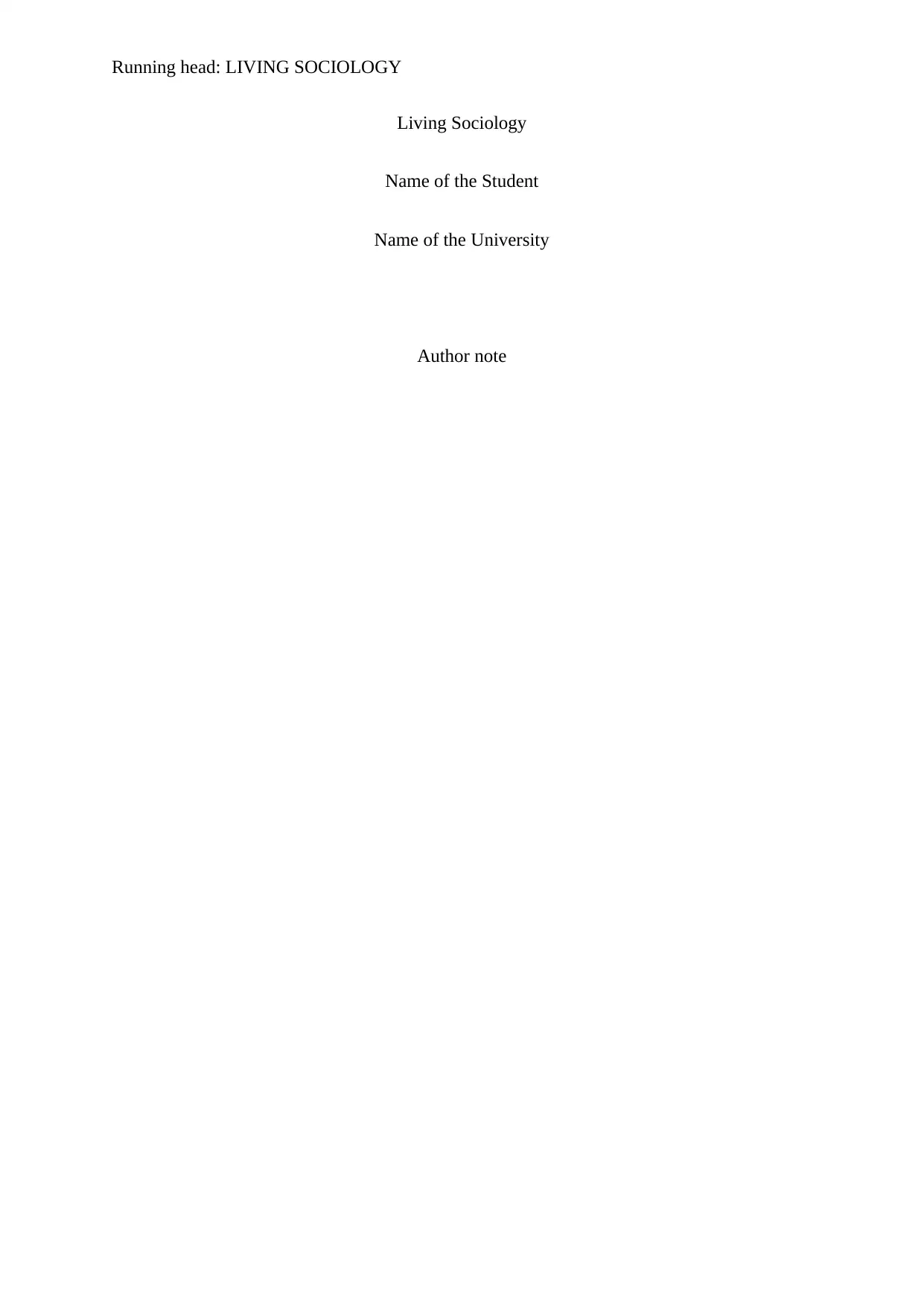
Running head: LIVING SOCIOLOGY
Living Sociology
Name of the Student
Name of the University
Author note
Living Sociology
Name of the Student
Name of the University
Author note
Paraphrase This Document
Need a fresh take? Get an instant paraphrase of this document with our AI Paraphraser
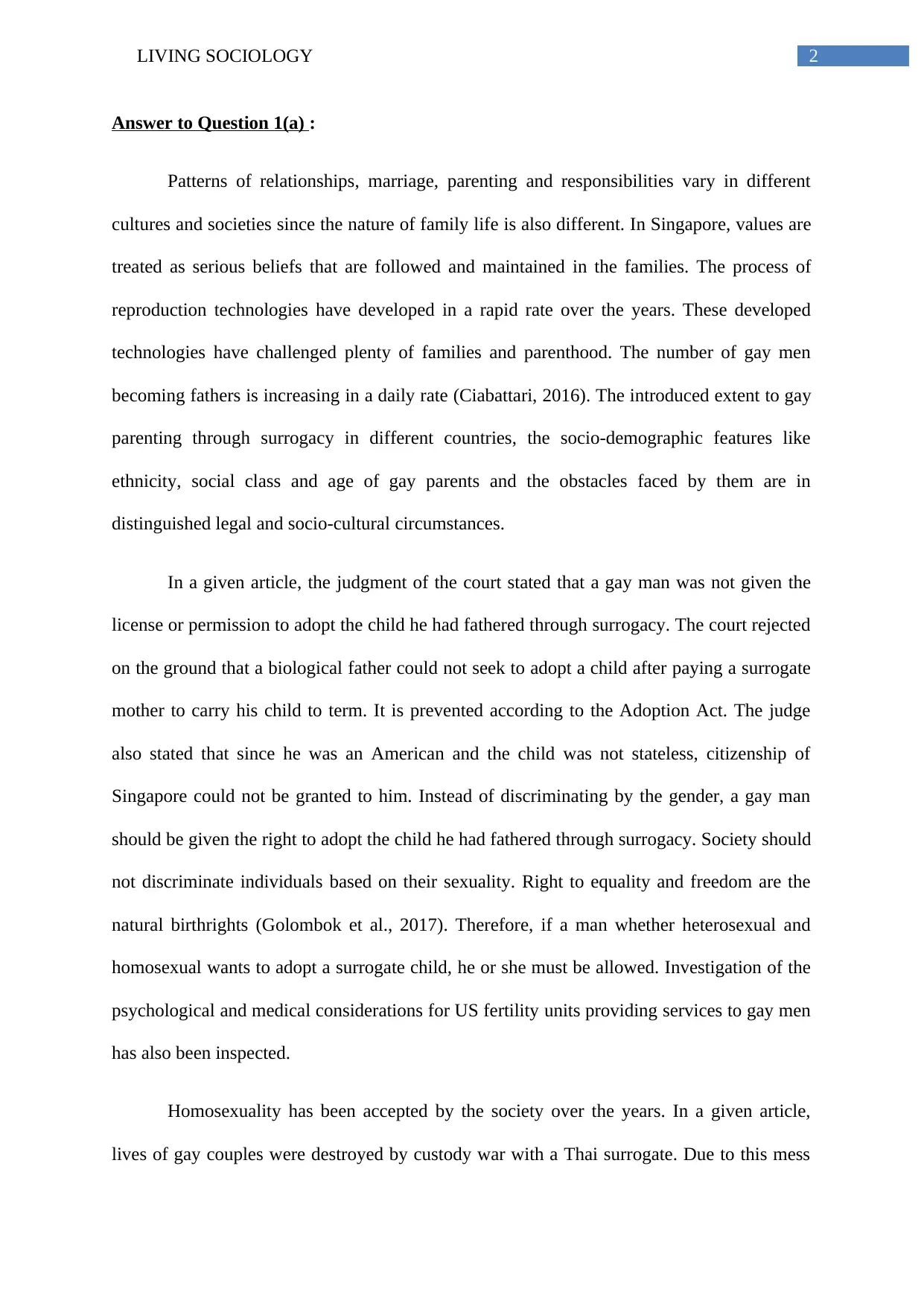
2LIVING SOCIOLOGY
Answer to Question 1(a) :
Patterns of relationships, marriage, parenting and responsibilities vary in different
cultures and societies since the nature of family life is also different. In Singapore, values are
treated as serious beliefs that are followed and maintained in the families. The process of
reproduction technologies have developed in a rapid rate over the years. These developed
technologies have challenged plenty of families and parenthood. The number of gay men
becoming fathers is increasing in a daily rate (Ciabattari, 2016). The introduced extent to gay
parenting through surrogacy in different countries, the socio-demographic features like
ethnicity, social class and age of gay parents and the obstacles faced by them are in
distinguished legal and socio-cultural circumstances.
In a given article, the judgment of the court stated that a gay man was not given the
license or permission to adopt the child he had fathered through surrogacy. The court rejected
on the ground that a biological father could not seek to adopt a child after paying a surrogate
mother to carry his child to term. It is prevented according to the Adoption Act. The judge
also stated that since he was an American and the child was not stateless, citizenship of
Singapore could not be granted to him. Instead of discriminating by the gender, a gay man
should be given the right to adopt the child he had fathered through surrogacy. Society should
not discriminate individuals based on their sexuality. Right to equality and freedom are the
natural birthrights (Golombok et al., 2017). Therefore, if a man whether heterosexual and
homosexual wants to adopt a surrogate child, he or she must be allowed. Investigation of the
psychological and medical considerations for US fertility units providing services to gay men
has also been inspected.
Homosexuality has been accepted by the society over the years. In a given article,
lives of gay couples were destroyed by custody war with a Thai surrogate. Due to this mess
Answer to Question 1(a) :
Patterns of relationships, marriage, parenting and responsibilities vary in different
cultures and societies since the nature of family life is also different. In Singapore, values are
treated as serious beliefs that are followed and maintained in the families. The process of
reproduction technologies have developed in a rapid rate over the years. These developed
technologies have challenged plenty of families and parenthood. The number of gay men
becoming fathers is increasing in a daily rate (Ciabattari, 2016). The introduced extent to gay
parenting through surrogacy in different countries, the socio-demographic features like
ethnicity, social class and age of gay parents and the obstacles faced by them are in
distinguished legal and socio-cultural circumstances.
In a given article, the judgment of the court stated that a gay man was not given the
license or permission to adopt the child he had fathered through surrogacy. The court rejected
on the ground that a biological father could not seek to adopt a child after paying a surrogate
mother to carry his child to term. It is prevented according to the Adoption Act. The judge
also stated that since he was an American and the child was not stateless, citizenship of
Singapore could not be granted to him. Instead of discriminating by the gender, a gay man
should be given the right to adopt the child he had fathered through surrogacy. Society should
not discriminate individuals based on their sexuality. Right to equality and freedom are the
natural birthrights (Golombok et al., 2017). Therefore, if a man whether heterosexual and
homosexual wants to adopt a surrogate child, he or she must be allowed. Investigation of the
psychological and medical considerations for US fertility units providing services to gay men
has also been inspected.
Homosexuality has been accepted by the society over the years. In a given article,
lives of gay couples were destroyed by custody war with a Thai surrogate. Due to this mess
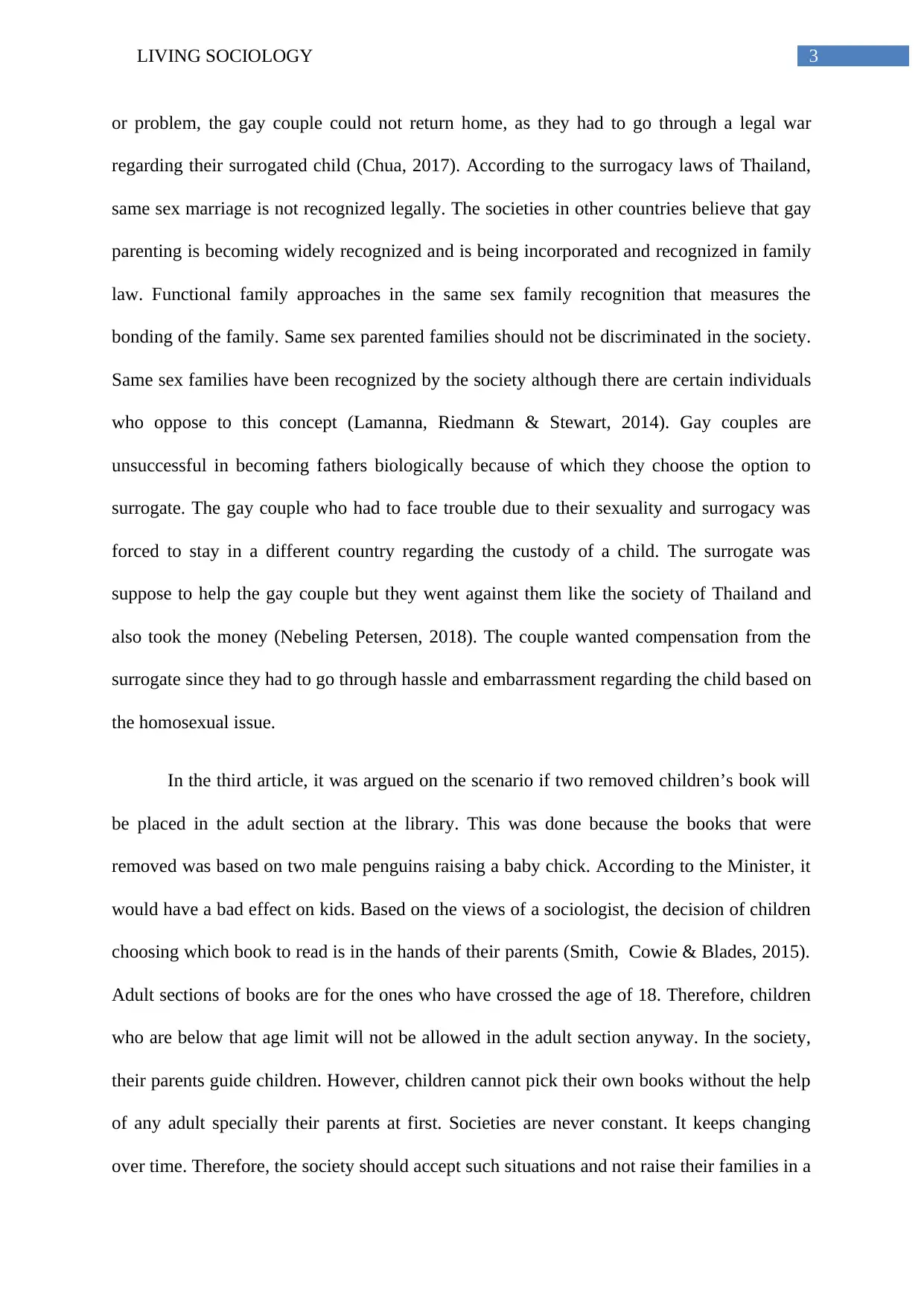
3LIVING SOCIOLOGY
or problem, the gay couple could not return home, as they had to go through a legal war
regarding their surrogated child (Chua, 2017). According to the surrogacy laws of Thailand,
same sex marriage is not recognized legally. The societies in other countries believe that gay
parenting is becoming widely recognized and is being incorporated and recognized in family
law. Functional family approaches in the same sex family recognition that measures the
bonding of the family. Same sex parented families should not be discriminated in the society.
Same sex families have been recognized by the society although there are certain individuals
who oppose to this concept (Lamanna, Riedmann & Stewart, 2014). Gay couples are
unsuccessful in becoming fathers biologically because of which they choose the option to
surrogate. The gay couple who had to face trouble due to their sexuality and surrogacy was
forced to stay in a different country regarding the custody of a child. The surrogate was
suppose to help the gay couple but they went against them like the society of Thailand and
also took the money (Nebeling Petersen, 2018). The couple wanted compensation from the
surrogate since they had to go through hassle and embarrassment regarding the child based on
the homosexual issue.
In the third article, it was argued on the scenario if two removed children’s book will
be placed in the adult section at the library. This was done because the books that were
removed was based on two male penguins raising a baby chick. According to the Minister, it
would have a bad effect on kids. Based on the views of a sociologist, the decision of children
choosing which book to read is in the hands of their parents (Smith, Cowie & Blades, 2015).
Adult sections of books are for the ones who have crossed the age of 18. Therefore, children
who are below that age limit will not be allowed in the adult section anyway. In the society,
their parents guide children. However, children cannot pick their own books without the help
of any adult specially their parents at first. Societies are never constant. It keeps changing
over time. Therefore, the society should accept such situations and not raise their families in a
or problem, the gay couple could not return home, as they had to go through a legal war
regarding their surrogated child (Chua, 2017). According to the surrogacy laws of Thailand,
same sex marriage is not recognized legally. The societies in other countries believe that gay
parenting is becoming widely recognized and is being incorporated and recognized in family
law. Functional family approaches in the same sex family recognition that measures the
bonding of the family. Same sex parented families should not be discriminated in the society.
Same sex families have been recognized by the society although there are certain individuals
who oppose to this concept (Lamanna, Riedmann & Stewart, 2014). Gay couples are
unsuccessful in becoming fathers biologically because of which they choose the option to
surrogate. The gay couple who had to face trouble due to their sexuality and surrogacy was
forced to stay in a different country regarding the custody of a child. The surrogate was
suppose to help the gay couple but they went against them like the society of Thailand and
also took the money (Nebeling Petersen, 2018). The couple wanted compensation from the
surrogate since they had to go through hassle and embarrassment regarding the child based on
the homosexual issue.
In the third article, it was argued on the scenario if two removed children’s book will
be placed in the adult section at the library. This was done because the books that were
removed was based on two male penguins raising a baby chick. According to the Minister, it
would have a bad effect on kids. Based on the views of a sociologist, the decision of children
choosing which book to read is in the hands of their parents (Smith, Cowie & Blades, 2015).
Adult sections of books are for the ones who have crossed the age of 18. Therefore, children
who are below that age limit will not be allowed in the adult section anyway. In the society,
their parents guide children. However, children cannot pick their own books without the help
of any adult specially their parents at first. Societies are never constant. It keeps changing
over time. Therefore, the society should accept such situations and not raise their families in a
⊘ This is a preview!⊘
Do you want full access?
Subscribe today to unlock all pages.

Trusted by 1+ million students worldwide
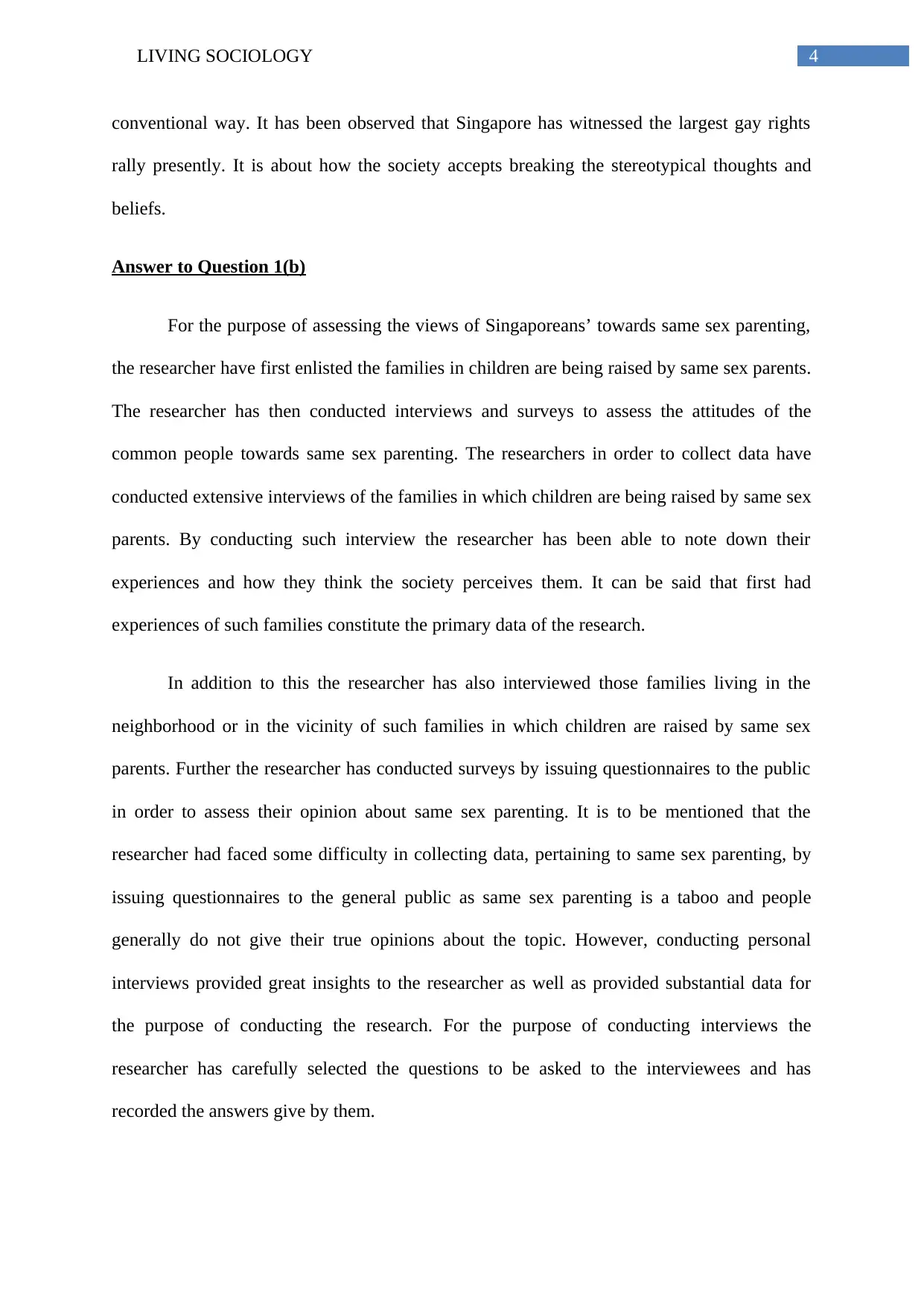
4LIVING SOCIOLOGY
conventional way. It has been observed that Singapore has witnessed the largest gay rights
rally presently. It is about how the society accepts breaking the stereotypical thoughts and
beliefs.
Answer to Question 1(b)
For the purpose of assessing the views of Singaporeans’ towards same sex parenting,
the researcher have first enlisted the families in children are being raised by same sex parents.
The researcher has then conducted interviews and surveys to assess the attitudes of the
common people towards same sex parenting. The researchers in order to collect data have
conducted extensive interviews of the families in which children are being raised by same sex
parents. By conducting such interview the researcher has been able to note down their
experiences and how they think the society perceives them. It can be said that first had
experiences of such families constitute the primary data of the research.
In addition to this the researcher has also interviewed those families living in the
neighborhood or in the vicinity of such families in which children are raised by same sex
parents. Further the researcher has conducted surveys by issuing questionnaires to the public
in order to assess their opinion about same sex parenting. It is to be mentioned that the
researcher had faced some difficulty in collecting data, pertaining to same sex parenting, by
issuing questionnaires to the general public as same sex parenting is a taboo and people
generally do not give their true opinions about the topic. However, conducting personal
interviews provided great insights to the researcher as well as provided substantial data for
the purpose of conducting the research. For the purpose of conducting interviews the
researcher has carefully selected the questions to be asked to the interviewees and has
recorded the answers give by them.
conventional way. It has been observed that Singapore has witnessed the largest gay rights
rally presently. It is about how the society accepts breaking the stereotypical thoughts and
beliefs.
Answer to Question 1(b)
For the purpose of assessing the views of Singaporeans’ towards same sex parenting,
the researcher have first enlisted the families in children are being raised by same sex parents.
The researcher has then conducted interviews and surveys to assess the attitudes of the
common people towards same sex parenting. The researchers in order to collect data have
conducted extensive interviews of the families in which children are being raised by same sex
parents. By conducting such interview the researcher has been able to note down their
experiences and how they think the society perceives them. It can be said that first had
experiences of such families constitute the primary data of the research.
In addition to this the researcher has also interviewed those families living in the
neighborhood or in the vicinity of such families in which children are raised by same sex
parents. Further the researcher has conducted surveys by issuing questionnaires to the public
in order to assess their opinion about same sex parenting. It is to be mentioned that the
researcher had faced some difficulty in collecting data, pertaining to same sex parenting, by
issuing questionnaires to the general public as same sex parenting is a taboo and people
generally do not give their true opinions about the topic. However, conducting personal
interviews provided great insights to the researcher as well as provided substantial data for
the purpose of conducting the research. For the purpose of conducting interviews the
researcher has carefully selected the questions to be asked to the interviewees and has
recorded the answers give by them.
Paraphrase This Document
Need a fresh take? Get an instant paraphrase of this document with our AI Paraphraser
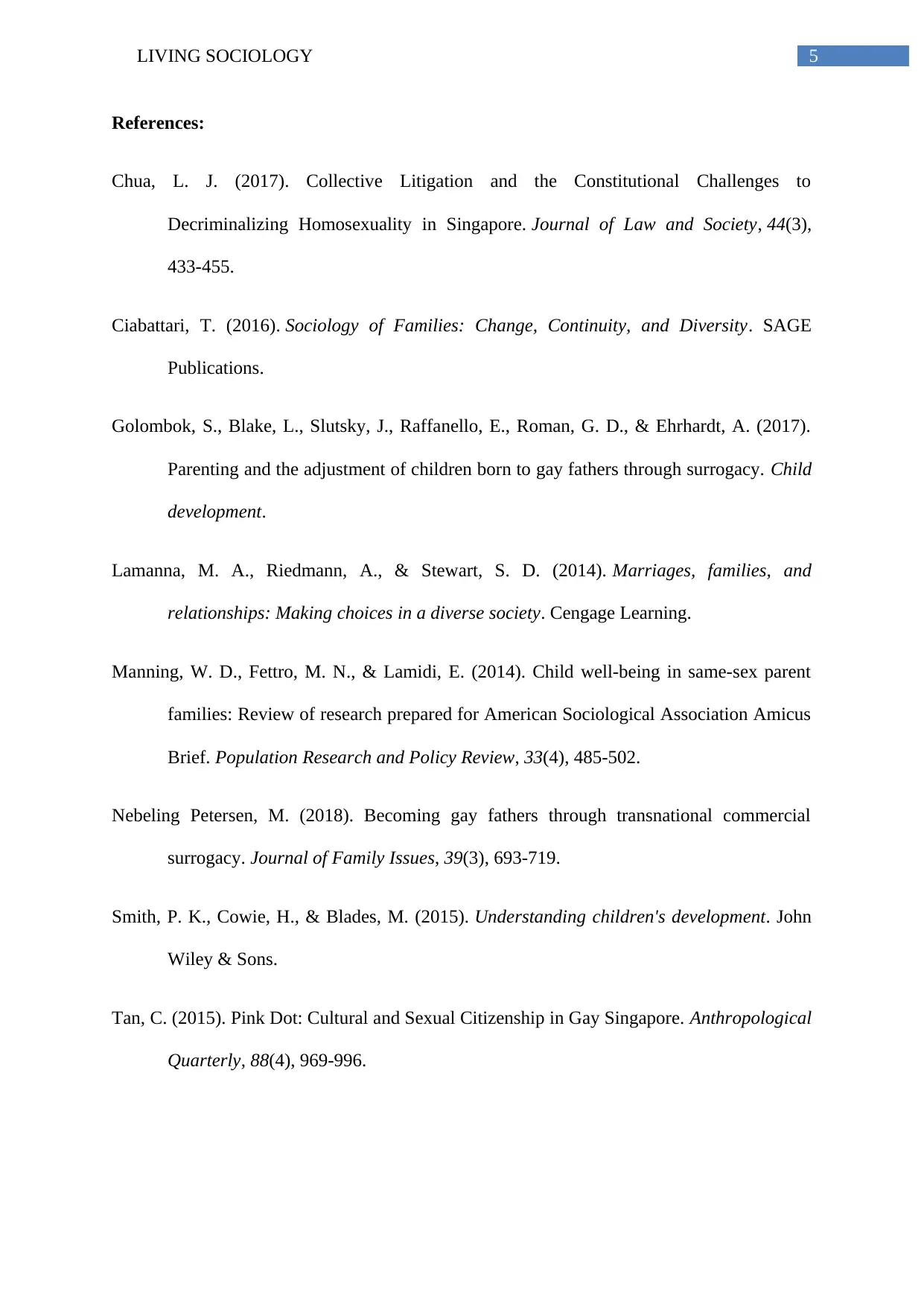
5LIVING SOCIOLOGY
References:
Chua, L. J. (2017). Collective Litigation and the Constitutional Challenges to
Decriminalizing Homosexuality in Singapore. Journal of Law and Society, 44(3),
433-455.
Ciabattari, T. (2016). Sociology of Families: Change, Continuity, and Diversity. SAGE
Publications.
Golombok, S., Blake, L., Slutsky, J., Raffanello, E., Roman, G. D., & Ehrhardt, A. (2017).
Parenting and the adjustment of children born to gay fathers through surrogacy. Child
development.
Lamanna, M. A., Riedmann, A., & Stewart, S. D. (2014). Marriages, families, and
relationships: Making choices in a diverse society. Cengage Learning.
Manning, W. D., Fettro, M. N., & Lamidi, E. (2014). Child well-being in same-sex parent
families: Review of research prepared for American Sociological Association Amicus
Brief. Population Research and Policy Review, 33(4), 485-502.
Nebeling Petersen, M. (2018). Becoming gay fathers through transnational commercial
surrogacy. Journal of Family Issues, 39(3), 693-719.
Smith, P. K., Cowie, H., & Blades, M. (2015). Understanding children's development. John
Wiley & Sons.
Tan, C. (2015). Pink Dot: Cultural and Sexual Citizenship in Gay Singapore. Anthropological
Quarterly, 88(4), 969-996.
References:
Chua, L. J. (2017). Collective Litigation and the Constitutional Challenges to
Decriminalizing Homosexuality in Singapore. Journal of Law and Society, 44(3),
433-455.
Ciabattari, T. (2016). Sociology of Families: Change, Continuity, and Diversity. SAGE
Publications.
Golombok, S., Blake, L., Slutsky, J., Raffanello, E., Roman, G. D., & Ehrhardt, A. (2017).
Parenting and the adjustment of children born to gay fathers through surrogacy. Child
development.
Lamanna, M. A., Riedmann, A., & Stewart, S. D. (2014). Marriages, families, and
relationships: Making choices in a diverse society. Cengage Learning.
Manning, W. D., Fettro, M. N., & Lamidi, E. (2014). Child well-being in same-sex parent
families: Review of research prepared for American Sociological Association Amicus
Brief. Population Research and Policy Review, 33(4), 485-502.
Nebeling Petersen, M. (2018). Becoming gay fathers through transnational commercial
surrogacy. Journal of Family Issues, 39(3), 693-719.
Smith, P. K., Cowie, H., & Blades, M. (2015). Understanding children's development. John
Wiley & Sons.
Tan, C. (2015). Pink Dot: Cultural and Sexual Citizenship in Gay Singapore. Anthropological
Quarterly, 88(4), 969-996.
1 out of 5
Related Documents
Your All-in-One AI-Powered Toolkit for Academic Success.
+13062052269
info@desklib.com
Available 24*7 on WhatsApp / Email
![[object Object]](/_next/static/media/star-bottom.7253800d.svg)
Unlock your academic potential
Copyright © 2020–2026 A2Z Services. All Rights Reserved. Developed and managed by ZUCOL.





